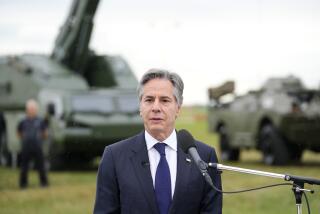No More Shooting Incidents--Soviets : Military Agrees Not to Use Weapons Against U.S. Unit in East Germany
- Share via
WASHINGTON — The Soviet military, seeking to resolve the dispute over the shooting of an American officer in East Germany last month, has agreed not to “use force or weapons” against members of the U.S. military team operating there, the State Department said Tuesday.
The Soviet commanders also agreed to refer “to higher authority” the U.S. demand for an apology and compensation for the family of the slain officer, Maj. Arthur D. Nicholson Jr., according to the State Department.
Nicholson, a member of an elite team based in East Germany, was killed March 24 when he was shot in the chest by a Soviet sentry who found him with a camera near a tank shed. The shooting occurred in an area that the Soviets say was closed to members of the U.S. military liaison team in East Germany. The United States has contended that the territory was not restricted.
No Interruption in Thaw
The shooting disrupted plans for at least one U.S.-Soviet ceremony, but officials took pains to emphasize that it should not be allowed to interrupt the apparent thaw in relations between the superpowers. The Soviet agreement to avoid the use of force in the future was seen as an effort to keep the incident from hindering such U.S.-Soviet contacts as the newly resumed arms control talks in Geneva.
The State Department said Gen. Glenn K. Otis, commander of the U.S. Army in Europe, and Gen. Mikhail M. Zaitsev, commander of Soviet forces in East Germany, met twice last Friday night for a total of 4 1/2 hours in Potsdam outside East Berlin, first at the Soviet officers’ club and then at the U.S. Military Liaison Mission.
“We obtained agreement from the Soviets that they will not permit use of force or weapons against the members of our military liaison mission in the future. They also agreed to refer our demand for an apology and compensation to the Nicholson family to higher authority,” the State Department said in a written statement.
However, a Reagan Administration official who spoke on the condition that he not be identified said the Soviet move to pass the discussion of an apology and compensation to higher authority does not increase the likelihood that this demand will be met.
‘Not Going to Apologize’
“The (Soviet) general took the position that he didn’t have the authority to go as far as discussing an apology or to offer compensation,” the official said. “They’re not going to apologize or compensate. They’re not going to come out in public and do anything like that.”
In addition, Soviet leader Mikhail S. Gorbachev was described as adamantly opposed to such steps when the subject of the shooting was raised last week by a U.S. congressional delegation that met with him in Moscow. One source close to the delegation said the Soviet leader expressed a view of the incident “totally at odds” with that of the Americans.
Robert E. Hunter, director of European studies at Georgetown University’s Center for Strategic and International Studies, said that, by referring the compensation question to others, the Soviets were “kicking it upstairs as a way of getting it off the table.”
The agreement, he said, reflected U.S. and Soviet efforts “to get this behind them because there are larger fish to fry.”
As a result of the shooting, U.S. military representatives were ordered not to take part in a ceremony April 25 marking the 40th anniversary of the meeting of Soviet and U.S. forces at the Elbe River in Germany just before World War II ended in Europe. But the Geneva talks have not been disrupted, and President Reagan said the shooting only made him more anxious to hold a summit with Gorbachev.
The subject of compensation for Nicholson’s wife and 8-year-old daughter caused a brief rift among U.S. officials in the government’s approach to the shooting. Defense Secretary Caspar W. Weinberger said April 2 that before Otis and Zaitsev could meet, the Soviets should “make some kind of an apology.”
But at the State Department, spokesman Bernard Kalb said an apology was not a precondition for talks between the U.S. and Soviet commanders.
The Military Liaison Mission has monitored Soviet and East German military activity since the end of World War II. The team is accredited to Soviet forces and serves as a contact with the Soviet military command, based in Potsdam. A similar Soviet group is assigned to the U.S. forces in West Germany.
However, the formal military contacts take a secondary role to what is considered the liaison groups’ job of “licensed spying,” and both teams have evolved into official intelligence-gatherers, Pentagon officials have said.
More to Read
Sign up for Essential California
The most important California stories and recommendations in your inbox every morning.
You may occasionally receive promotional content from the Los Angeles Times.













